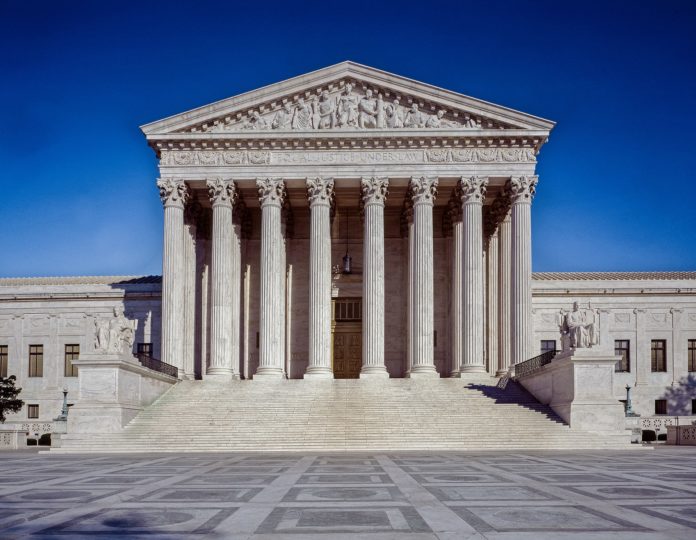
The U.S. Supreme Court on Jan. 13 agreed to hear consolidated cases involving the False Claims Act coming out of the 7th Circuit Court of Appeals.
They are qui tam cases, which allow private parties to bring whistleblower lawsuits on behalf of the federal government and receive a percentage of the government’s award if the case is won. According to the petition for a writ of certiorari from one of the cases, the False Claims Act imposes liability if a defendant knowingly makes false claims or statements to the government and in order to establish liability, the FCA requires both falsity and scienter. Scienter shows intent of wrongdoing or knowledge of it.
In one of the cases, U.S et al. ex rel. Schutte and Yarberry, v. SuperValu, Inc., et al., the petitioners alleged SuperValu, a grocery and pharmacy chain, intentionally misreported the usual and customary prices, or U&C, it charged for prescription drugs which allegedly caused government healthcare programs like Medicare and Medicaid to pay more for drugs.
Tracy Schutte and Michael Yarberry are relators on behalf of the U.S. and other state governments in the case. According to a prior court document, Schutte briefly worked as a pharmacist for SuperValu while Yarberry hadn’t been employed by the defendant, but was a pharmacist.
The petition said SuperValu used a price-matching program to get customers to purchase drugs at its in-store pharmacies, leading to more than six million price matches in 10 years. The petition noted that under SuperValu’s contracts with pharmacy benefits managers, as well as under Medicaid regulations, the company wasn’t allowed to charge the government more than the U&C price it charged to customers paying out of pocket.
The petition argued SuperValu’s discount program created a legal problem because it offered discounts so often that the discount prices became U&C prices for cash customers. SuperValu is accused of not reporting the discount prices and instead continued reporting and charging the government higher prices. The petitioners believed SuperValu knew the reporting was problematic.
The 7th Circuit previously held in U.S. ex. rel. Garbe v. Kmart Corp. prices under discount programs similar to SuperValu’s, according to the petition, need to be reported as U&C prices and if those prices aren’t properly reported, a pharmacy can be held liable under the FCA.
A lawsuit was filed against the respondents in the Central District of Illinois, the petition said, and after the 7th Circuit decided Garbe the district court granted partial summary judgment to the petitioners on the element of falsity, holding the respondents’ lower matched prices are the U&C prices, meaning Medicare and Medicaid are entitled to those prices.
About a year later, according to the petition, the district court granted summary judgment to the defendants on the element of the scienter, holding if there was more than one interpretation of U&C prices, and the respondent’s interpretation was consistent with that, a defendant shouldn’t be treated as a knowing or reckless violator. The district court connected that ruling back to the U.S. Supreme Court’s decision in Safeco Insurance Co. of America v. Burr from 2007.
The petitioners appealed to the 7th Circuit which affirmed. That court, according to the petition, held that a court cannot find scienter as a matter of law if a defendant’s conduct falls within a reasonable interpretation of the law and no authoritative guidance cautioned against it.
The question before the U.S. Supreme Court, in this case, is: “Whether and when a defendant’s contemporaneous subjective understanding or beliefs about the lawfulness of its conduct are relevant to whether it ‘knowingly’ violated the False Claims Act.”
This question is also being brought forward in another case before the U.S. Supreme Court that’s consolidated with SuperValu. In U.S. et al. ex rel. Thomas Proctor v. Safeway Inc., the whistleblower plaintiff alleged Safeway overcharged the government for prescription drugs while knowingly misreporting the U&C prices. Proctor previously worked as a pharmacist at a Safeway-affiliated store.
The 7th Circuit affirmed a summary judgment for Safeway, according to the petition, holding it didn’t act knowingly when it comes to how the FCA defines that term because an objectively reasonable interpretation of U&C prices could have allowed Safeway to make the reports it did as no authoritative guidance foreclosed that interpretation.
From that process, the petition argued, the 7th Circuit held that evidence of Safeway’s subjective understanding or beliefs about U&C prices, which allegedly showed Safeway executives believed the reporting wasn’t correct, was irrelevant to whether Safeway acted knowingly.
“Instead, Safeway could prevail by convincing a court after the fact that its conduct fell within a reasonable interpretation of U&C, even if it did not believe that interpretation to be correct at the time it submitted claims for payment,” the petition continued. “This petition asks the Court to decide whether that interpretation of the FCA’s scienter requirement is correct, and argues that it is not.”
No date has been set for when the U.S. Supreme Court will hear the consolidated cases.

